“Garantex’s international pipeline helps defy Treasury sanctions by channeling rubles to crypto to dollars. Customers line up with bags of cash.”

Big Piles of Cash
The Wall Street Journal reports The Crypto Exchange Moving Money for Criminal Gangs, Rich Russians and a Hamas-Linked Terror Group
That is a free link for those wishing to read in entirety. Here are a few snips from a long article.
Despite its place on the U.S. blacklist, which restricts transactions with sanctioned entities, Garantex has become a major channel through which Russians move funds into and out of the country, according to trading data and people familiar with the firm. It has also been a vehicle for Russian cybercriminals to launder their earnings, U.S. authorities say.
Garantex’s growing role as a global conduit for illicit funds was underscored this month by evidence that Palestinian militants in part financed their operations through crypto in the lead-up to the Oct. 7 attacks in Israel. Digital wallets controlled by Palestinian Islamic Jihad, which joined Hamas in the attacks, received a portion of $93 million via Garantex, according to analysis by researcher Elliptic, which said Hamas also used a similar financing strategy.
The U.S. Treasury, in a report last year, said gaps in financial crime controls at crypto exchanges can allow terrorist groups to misuse them. Israeli Defense Minister Yoav Gallant said last summer the use of digital currencies was making the job of stopping terrorist financing ever more complex.
In Russia, the exchange is used to move rubles into other currencies, which is more difficult amid sanctions on Russian banks after the invasion of Ukraine. Customers deposit rubles in cash at Garantex’s offices to receive crypto, primarily in the form of stablecoins, a popular type of digital currency often pegged to the U.S. dollar. These can then be withdrawn as traditional currency abroad from a network of local partners, with little trackable record of the transactions.
Garantex’s expansion raises questions about the effectiveness of U.S. sanctions when targeted at entities that are financially insulated in a hostile territory, said Juan Zarate, a former senior Treasury and White House counterterrorism official. “It does suggest the limits of what OFAC can do,” said Zarate, referring to Treasury’s Office of Foreign Assets Control. “OFAC tools, though powerful, aren’t a silver bullet.”
Three weeks after the sanctions, Garantex told clients it had launched a partnership with an operator called Bithauz in the United Arab Emirates. In person at Bithauz’s Dubai office, customers could trade up to $5 million in tether at a time for dirhams, the local currency, and dollars. This sort of cash-based business, which is similar to Garantex’s other overseas partners, is difficult for international sanctions authorities to track, researchers say.
Tether, Not Bitcoin
The preferred currency for laundering appears to be Tether, not Bitcoin or crypto in general. The article mentioned tether three times. Bitcoin had no mentions.
Eventually, regulators will use money laundering claims to force use of a digital dollar at the Fed.
The aim will be to block all transactions into or out of dollars the regulators do not approve.
It’s coming. And there is a lot of complacency here from Bitcoin fans too. If conversion to fiat is impossible, Bitcoin would be reduced to barter.
But now, it is tether in the crosshairs.
Flashback of the Day
In 2017 I noted The former chief economist of the World Bank, Joseph Stiglitz Wants Bitcoin Banned.
“Bitcoin is successful only because of its potential for circumvention, lack of oversight,” Joseph Stigliz, currently a professor at Columbia University, said in an interview on Bloomberg Television today, as the cryptocurrency reached new all-time highs this week. “So it seems to me it ought to be outlawed. It doesn’t serve any socially useful function.”
I replied, I’ll tell you what ought to be outlawed: The Fed.
I Propose a Debate on Bitcoin Between Nassim Taleb and Lyn Alden
On September 11, 2023 I Propose a Debate on Bitcoin Between Nassim Taleb and Lyn Alden
In my post I noted a fundamental flaw of Bitcoin. Ironically, I think Alden would trounce Taleb.





